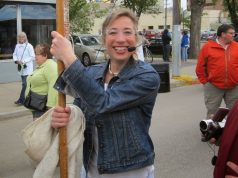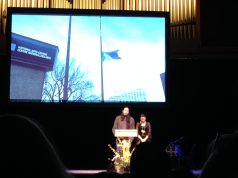Editor’s Note:
When I read Mike Payette’s Facebook Note about experiencing blackface by as an audience member at Théâtre du Rideau Vert, I asked him if he would like to republish it immediately on praxistheatre.com. It had an urgency and immediacy that I wanted to help amplify. He gave it a small edit and and the title Not My Theatre. We published it three days before Christmas, which is historically a lousy time for traffic.
By the time New Years hit, it was the most-read post on the site in 2014.
A) Why did you choose to first publish this piece on Facebook?
After hearing about the use of blackface on stage in my city, it had brought back to light past accounts that I had read through the press dating back years; the presence of it in our cultural and educational institutions. These examples were only stories I had heard, but I hadn’t personally seen it live on stage until the Théâtre du Rideau Vert’s year-end revue. Once I had seen it, I had not been prepared for the visceral reaction I would have. It was right in front of me and I could not escape the image. I thought about it over the course of that night, lost sleep over it, and agonized over it the morning after until — perhaps impulsively – I saw an outlet to express my thoughts.
I am a fairly private person and issues related to race (and other) politics had mainly been explored or discussed amongst peers or sometimes through my work; rarely on social media. At the time, I couldn’t vocally articulate what had happened, so I chose to write the thoughts before posting it on facebook. Once I had, I expected only a few comments, maybe an engaged discussion, but deep down I was hoping that my contribution would add to what had already existed concerning this event, and that ultimately TRV would find out and remove the sketch.
B) Has anything changed in the discourse about the use blackface in Quebec theatre from this incident?
This is history repeating itself. There have been dozens of articles over the past few years “reporting” on the persistence of blackface in Québec culture. In this particular instance, there are about 20 publications (and counting) surrounding the racist act. If anything, it has put to light a very clear delineation of philosophies regarding freedom of expression, slavery and race awareness within Québec and Canada and whether or not people should be respectful of that history – rather, believe it ever existed – and further, the responsibility of what messages and images we bring forward to our audiences, and inevitably, our society.
It appears as though those who have called out any act of racism or this use of blackface are being accused of a) using an example of an American and British history that is outside of a Québec (Canadian) experience b) making a big deal over nothing because it’s “just make-up” c) not understanding that Québec is “different” than other provinces, and that its cultural heritage is being attacked.
The majority of these people are, apparently, Francophone Québecers, and it is here that the biggest line has been drawn, one that is frightening as a Québec-born individual such as myself. What has evolved is a lot of people’s strengthening platform to call out offensive representation, but it is an incredibly uncomfortable environment in the arts in Québec right now. The response, after weeks of effort, of begging for dialogue (not soap-boxing), was that TRV and Artistic Director Denise Filiatrault – due to their outrage of being singled out – will never hire a Black actor for their these shows again. And the sketch was never pulled for its original nor extended run.
Where some have been looking for progress, others have supported a completely arrogant dismissal of what it is that’s being talked about and a mockery of those who feel offended. People speaking out about this (and I mean ALL who have shared, commented, liked, been interviewed, etc) are not asking for common understanding and respect (humanity) because they want to, but because they have to.
C) A corollary result of this discourse has been to reveal a large gap between Anglo and Franco media on identity politics. French media has (with exceptions) been largely ambivalent about blackface at TRV, while Anglo media has continued to pursue it. How to get this issue taken more seriously by French language media in the future?
There have been a few exceptions wherein not every French media outlet is trying to hold on to a ridiculous notion that blackface is not a historically racist symbol. Moreover, it should be noted that Diversité artistique Montréal (DAM), a primarily Francophone organization supporting the rights of ALL diverse cultures within the city’s arts landscape, has been one of the forefront speakers opposing the use of blackface by the theatre.
Recently, a La Presse journalist took a position to highlight what it was that Québec was trying to defend (in their use of blackface), for what purposes, and that – despite “good intentions” blackface is not a good option – EVER. It was one of, if not THE first piece from French media that saw this as a serious issue; coming over a month after the first Anglo article, and almost a week after the show closed. But every bit helps.
What would directly affect theatres (and let’s consider all performing arts) is a discussion with the organizations, unions, funding bodies, and audiences that support the arts, both in English and French to put all cards on the table regarding this discussion and the use of historic oppressive symbols that are being touted in public forums. Let’s bring to the table CEOs of Québecor or Vidéotron who support TRV and see how they feel about their sponsoring of these acts. Let’s hear from le Conseil québécois de théâtre (the French equivalent of the Professional Association of Canadian Theatres) as well as Union des artistes who have remained noticeably silent throughout this.
For myself, I will not perpetuate the argument that this is a Franco vs. Anglo issue as we all live within the same rich geography and we all have a responsibility to pursue acceptance, acknowledgement and respect for how we wish to grow and evolve together. Québec has been regarded as a haven for many cultures entering Canada, to thrive and coexist, so there is no longer room for hypocrisy here.
D) What’s the most important thing you’re taking away from your experience being at the centre of this discussion?
This is a very long road.
However, the reach in which this story has taken has been a real banding together of minds who are trying to move forward, despite some very hurtful, harmful, and pervasively ugly voices and “trolling” that are trying to prevent that. I am pleased to see a continuing awareness of this from coast to coast, uniting for and standing up for Black and other artists of colour in Québec and Canada, because we equally share a deep love and passion for what it is that we do.
Having to remind people of this is exhausting, sometimes deflating. Having to prove to your neighbour – quite literally sometimes – of symbols that many parts of the world have already excepted as racist and offensive carries a lot of weight and asks the question of how far we have actually come. One of the most frequent responses to the blackface coverage has been “How could this happen? It’s 2015!” Yes. It is. I look forward to a time when we don’t have to call out the present as being a reflection of the past.










